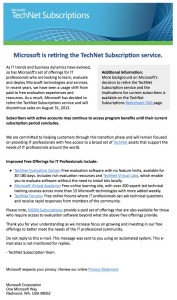Microsoft Ending TechNet Program, Shuts Down August 31

Microsoft’s march towards universal subscription software has taken another victim. TechNet, the company’s software portal for IT professionals, will stop accepting new memberships on August 31, 2013 and will shut down completely on September 30, 2014, according to an email sent to subscribers Monday.

TechNet was launched in 1998 and gave IT professionals access to virtually all of Microsoft’s desktop software. For a yearly fee that, over the years, ranged between $200 and $500, members could download current and past versions of Office, Windows, SharePoint, SQL, Server tools, and more, along with multiple licenses for each product that granted the user full access to the software.
These licenses were intended for evaluation and testing purposes only and, indeed, many IT pros used them in line with Microsoft’s terms. Without such a program, it would be financially impossible for smaller corporate environments to test their software and deployments on a wide range of Microsoft products; the retail cost of the full range of software offered by TechNet’s yearly fee would easily run into the tens, if not hundreds, of thousands of dollars.
But two developments occurred during the past several years that prompted Microsoft to close TechNet. First, Microsoft now offers free trials, ranging from 30 to 180 days depending on the product and terms, for most of its desktop software. These free trials should in theory cover nearly all of the use cases for IT testing and evaluation. This is the “official” reason Microsoft quoted for TechNet’s demise.
The second, and almost certainly more important, change was abuse of the system. TechNet was intended for IT professionals, but practically anyone with the funds to cover the membership fee could join. Once in the program, there were no real-world limitations on the product keys provided; users with a TechNet product key for Windows, for example, could use it perpetually in the exact same manner as a full-priced retail key. Only a manual software audit by Microsoft would discover that the key was being used against TechNet’s terms of service.
This led to two scenarios: first, many TechNet members would buy a single membership for a few hundred dollars and then have perpetual access to all of that year’s current Microsoft software. They could install multiple “genuine” copies of Windows, Office, and more on all of their personal computers as well as the computers of family members and friends. Second, and even worse, some TechNet members would sell their product keys online via eBay or Craigslist, a gross abuse of the benefits offered by the program.
Microsoft attempted to address these issues over the years by reducing the number of product keys provided by each TechNet subscription. When the program started, it offered 10 keys for each product. Microsoft reduced that to 5 in 2010 and then to only 3 keys last year. With Monday’s announcement, however, it appears that the company was not satisfied with the effectiveness of its changes, and it is clear that Microsoft would rather have smaller customers paying for (or, even better, subscribing to) each copy of software instead of a less lucrative membership model.
TechNet will begin the shutdown process this fall. New memberships won’t be accepted after August 31, 2013, and those that have already been purchased must be activated by September 30, 2013. Memberships that are already active will retain their full benefits until the date of their expiration. In practice, this means the effective death of TechNet will arrive on September 30, 2014 (assuming you activate a membership on the last possible day, September 30, 2013).
For current TechNet members, already-claimed product keys will continue to work after the fall of TechNet, although the license for the products associated with them will technically cease upon the expiration of each membership. This means that activated software will continue to work, but users will be in violation of Microsoft’s terms, something that many TechNet members are already comfortable with.
The TechNet forums and online customer support features of the service will remain available free of charge, and Microsoft recommends that users still interested in “all you can eat” software memberships look into an MSDN subscription. This service, however, which is targeted towards developers, costs significantly more than an equivalent TechNet subscription. An MSDN membership plan with the same level of software access as TechNet starts at $6,119 (although there is a plan starting at $699 that provides access to Windows only). This means that only larger businesses will find value in MSDN as a replacement for TechNet; everyone else will have to make due with time-limited free trials.
Those interested in trying the service before its demise can purchase a membership plan online at the TechNet portal.
So goodnight, dear TechNet. You shall be missed.

















